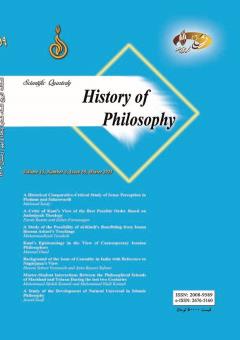A Historical Comparative-Critical Study of Sense Perception in Plotinus and Suhrawardī
Subject Areas : Geneology of philosophical schools and Ideas
1 - Associate Professor, Philosophy and Wisdom Department, Shahed University, Tehran, Iran
Keywords: sense perception, vision, Plotinus, Suhrawardī, philosophical esoteric interpretation, theory of impression, beam theory,
Abstract :
The quality of the knowledge of the world and Man’s encounter with external things through their sense perceptions marks the beginning of philosophical discussions. Great philosophers usually investigate such issues under the problem of vision. The present study comparatively examines the theories of Plotinus and Suhrawardī in this regard and demonstrates that, although these two philosophers belong to different philosophical schools, and although Suhrawardī had merely access to a part of Plotinus’ works, namely, Athulujiya, there are several similarities between their theories. Both of them harshly criticize the theories on sense perception, that is, the impression of scientific forms on perceptual faculties (the theory of Aristotle and his followers) and the reflection of light rays from the faculties of sense perception and their contact with the external object for perception to be realized (the theory of some pre-Socratic philosophers and Plato). Both Plotinus and Suhrawardī believe that the presence of the known before the knower and the lack of any obstacle between them results in Man’s perception of the external thing. At this time, the human soul attains an illuminative presential attribution of the perceived thing, which finally leads to the occurrence of vision. This theory is quite innovative and might be capable of solving certain philosophical problems regarding vision; however, there are some criticisms against it. For example, it cannot be applied to the hearing of sounds from behind a wall or smelling an odor in spite of some external barriers and, thus, is contradicted.
